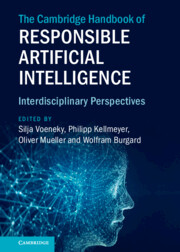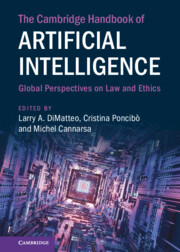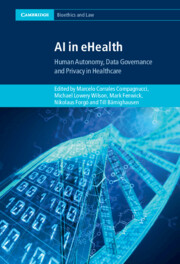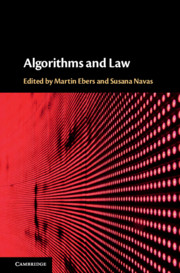The Cambridge Handbook of Responsible Artificial Intelligence
Interdisciplinary Perspectives
£150.00
Part of Cambridge Law Handbooks
- Editors:
- Silja Voeneky, Albert-Ludwigs-Universität Freiburg, Germany
- Philipp Kellmeyer, Medical Center, Albert-Ludwigs-Universität Freiburg, Germany
- Oliver Mueller, Albert-Ludwigs-Universität Freiburg, Germany
- Wolfram Burgard, Technische Universität Nürnberg
- Date Published: November 2022
- availability: Available
- format: Hardback
- isbn: 9781009207867
£
150.00
Hardback
Other available formats:
eBook
Looking for an inspection copy?
This title is not currently available on inspection
-
In the past decade, artificial intelligence (AI) has become a disruptive force around the world, offering enormous potential for innovation but also creating hazards and risks for individuals and the societies in which they live. This volume addresses the most pressing philosophical, ethical, legal, and societal challenges posed by AI. Contributors from different disciplines and sectors explore the foundational and normative aspects of responsible AI and provide a basis for a transdisciplinary approach to responsible AI. This work, which is designed to foster future discussions to develop proportional approaches to AI governance, will enable scholars, scientists, and other actors to identify normative frameworks for AI to allow societies, states, and the international community to unlock the potential for responsible innovation in this critical field. This book is also available as Open Access on Cambridge Core.
Read more- Includes perspectives from different disciplines (robotics, mathematics, law, philosophy, ethics, economics etc) to exemplify inter-disciplinary research in the field of AI governance
- Provides an overview of current discussions about fundamental problems in the area of AI governance and regulation, as bias and discrimination
- Available as Open Access on Cambridge Core
Reviews & endorsements
'… an indispensable and thought-provoking resource for shaping the future of AI and its societal impact.' Matija Franklin, Prometheus
Customer reviews
Not yet reviewed
Be the first to review
Review was not posted due to profanity
×Product details
- Date Published: November 2022
- format: Hardback
- isbn: 9781009207867
- length: 500 pages
- dimensions: 262 x 184 x 32 mm
- weight: 1.17kg
- availability: Available
Table of Contents
Introduction
Part I. Foundations of Responsible AI:
1. Artificial Intelligence – Key Technologies and Opportunities Wolfram Burgard
2. Automating Supervision of AI Delegates Jaan Tallinn and Richard Ngo
3. Artificial Moral Agents – Conceptual Issues and Ethical Controversy Catrin Misselhorn
4. Risk Imposition by Artificial Agents – The Moral Proxy Problem Johanna Thoma
5. Artificial Intelligence and its Integration into the Human Lifeworld Christoph Durt
Part II. Current and Future Approaches to AI Governance:
6. Artificial Intelligence and the Past, Present and Future of Democracy Mathias Risse
7. The New Regulation of the European Union on Artificial Intelligence – Fuzzy Ethics Diffuse into Domestic Law and Sideline International Law Thomas Burri
8. Fostering the Common Good – An Adaptive Approach Regulating High-Risk AI-Driven Products and Services Thorsten Schmidt and Silja Voeneky
9. China's Normative Systems for Responsible AI – From Soft Law to Hard Law Weixing Shen and Yun Liu
10. Towards a Global Artificial Intelligence Charter Thomas Metzinger
11. Intellectual Debt – With Great Power Comes Great Ignorance Jonathan Zittrain
Part III. Responsible AI Liability Schemes:
12. Liability for Artificial Intelligence – The Need to Address both Safety Risks and Fundamental Rights Risks Christiane Wendehorst
13. Forward to the Past – A Critical Evaluation of the European Approach to Artificial Intelligence in Private International Law Jan von Hein
Part IV. Fairness and Non-Discrimination in AI Systems:
14. Differences that Make a Difference – Computational Profiling and Fairness to Individuals Wilfried Hinsch
15. Discriminatory AI and the Law – Legal Standards for Algorithmic Profiling Antje von Ungern-Sternberg
Part V. Responsible Data Governance:
16. Artificial Intelligence and the Right to Data Protection Ralf Poscher
17. Artificial Intelligence as a Challenge for Data Protection Law – And Vice Versa Boris Paal
18. Data Governance and Trust – Lessons from South Korean Experiences Coping with COVID-19 Haksoo Ko, Sangchul Park and Yong Lim
Part VI. Responsible Corporate Governance of AI Systems:
19. From Corporate Governance to Algorithm Governance – Artificial Intelligence as a Challenge for Corporations and their Executives Jan Lieder
20. Autonomization and Antitrust – On the Construal of the Cartel Prohibition in the Light of Algorithmic Collusion Stefan Thomas
21. Artificial Intelligence in Financial Services – New Risks and the Need for More Regulation? Matthias Paul
Part VII. Responsible AI Healthcare and Neurotechnology Governance:
22. Medical AI – Key Elements at the International Level Fruzsina Molnár-Gábor and Johanne Giesecke
23. 'Hey Siri, How Am I Doing?' – Legal Challenges for Artificial Intelligence Alter Egos in Healthcare Christoph Kroenke
24. Neurorights – A Human-Rights Based Approach for Governing Neurotechnologies Philipp Kellmeyer
25. AI-Supported Brain-Computer Interfaces and the Emergence of 'Cyberbilities' Boris Essmann and Oliver Mueller
Part VIII. Responsible AI for Security Applications and in Armed Conflict:
26. Artificial Intelligence, Law and National Security Ebrahim Afsah
27. Morally Repugnant Weaponry? Ethical Responses to the Prospect of Autonomous Weapons Alex Leveringhaus
28. On 'Responsible AI' in War – Exploring Preconditions for Respecting International Law in Armed Conflict Dustin A. Lewis.
Sorry, this resource is locked
Please register or sign in to request access. If you are having problems accessing these resources please email [email protected]
Register Sign in» Proceed
You are now leaving the Cambridge University Press website. Your eBook purchase and download will be completed by our partner www.ebooks.com. Please see the permission section of the www.ebooks.com catalogue page for details of the print & copy limits on our eBooks.
Continue ×Are you sure you want to delete your account?
This cannot be undone.
Thank you for your feedback which will help us improve our service.
If you requested a response, we will make sure to get back to you shortly.
×






